The silent French film serial Vingt ans après/The Return of the Musketeers (1922) is the sequel to Les Trois Mousquetaires/The Three Musketeers (1921), one of the first film versions of Alexandre Dumas père's famous novel. The sequel literally plays twenty years later after Les Trois Mousquetaires. Both film versions were directed by Henri Diamant-Berger. And as they did for the film adaptation of Les Trois Mousquetaires, Cinémagazine and Pathé produced a beautiful series of sepia portrait postcards especially for Vingt ans après.

French postcard. Photo: Pathé. Publicity still for Vingt ans après/The Return of the Musketeers (Henri Diamant-Berger, 1922). Athos (Henri Rollan) and his son Raoul, played by actress Pierrette Madd.

French postcard. Photo: Pathé. Publicity still for Vingt ans après/The Return of the Musketeers (Henri Diamant-Berger, 1922). Collection: Didier Hanson.
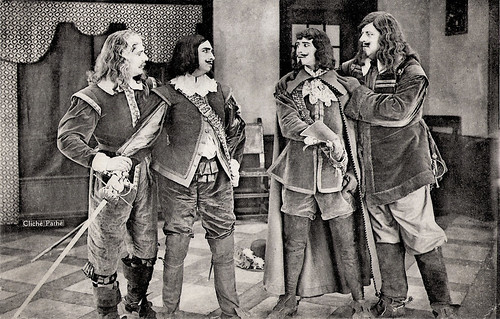
French postcard. Photo: Pathé. Publicity still for Vingt ans après/The Return of the Musketeers (Henri Diamant-Berger, 1922). Collection: Didier Hanson.
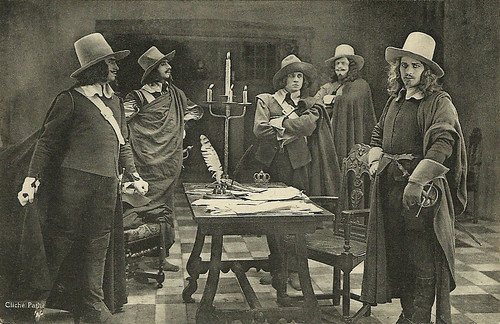
French postcard. Photo: Pathé. Publicity still for Vingt ans après/The Return of the Musketeers (Henri Diamant-Berger, 1922). Collection: Didier Hanson.
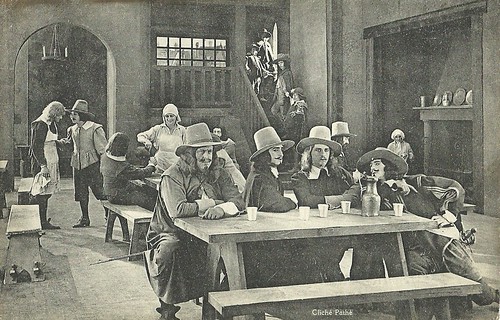
French postcard. Photo: Pathé. Publicity still for Vingt ans après/The Return of the Musketeers (Henri Diamant-Berger, 1922). The four musketeers Porthos (Charles Martinelli), Aramis (Pierre de Guingand), Athos (Henri Rollan), and D'Artagnan (Jean Yonnel).
Vingt ans après literally translates as Twenty Years After, but abroad the film was also known as The Return of the Three Musketeers. It was a sequel to the successful Pathé serial Les Trois Mousquetaires/The Three Musketeers (Henri Diamant-Berger, 1921), which had been only the second adaptation of the famous adventure novel by Alexandre Dumas père, published in 1844.
Vingt ans après/The Return of the Musketeers (Henri Diamant-Berger, 1922) was also based on a novel by Alexandre Dumas père. Dumas first serialised Vingt ans après from January to August 1845. His novel follows events in France during the Fronde, during the childhood reign of Louis XIV, and in England near the end of the English Civil War, leading up to the victory of Oliver Cromwell and the execution of King Charles I.
Through the words of the main characters, particularly Athos, Dumas comes out on the side of the monarchy in general, or at least the text often praises the idea of benevolent royalty. His musketeers are valiant and just in their efforts to protect young Louis XIV and the doomed Charles I from their attackers.
Vingt ans après precedes another novel, The Vicomte of Bragelonne: Ten Years Later (Le Vicomte de Bragelonne ou Dix ans plus tard), which appeared first in serial form between 1847 and 1850.
It includes the subplot The Man in the Iron Mask about the fictive twin brother of Louis XIV, Philippe, who had been concealed and imprisoned from birth by his father, Louis XIII, and his mother, Anne of Austria, 'for the good of France'.
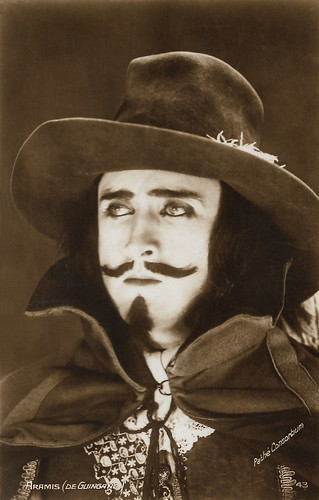
Pierre de Guingand as Aramis. French postcard by Cinémagazine Edition no. 43. Photo: Pathé Consortium Cinéma. Publicity still for Vingt Ans Après (1922).
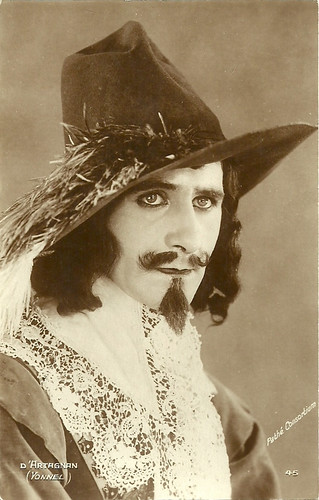
Jean Yonnel as D'Artagnan. French postcard by Editions Cinémagazine Edition, no. 45. Photo: Pathé Consortium Cinéma. Publicity still for Vingt Ans Après (1922).

Pierrette Madd as Raoul, the Vicomte de Bragelonne. French postcard by Cinémagazine Edition no. 47. Photo: Pathé Consortium Cinéma. Publicity still for Vingt Ans Après (1922).
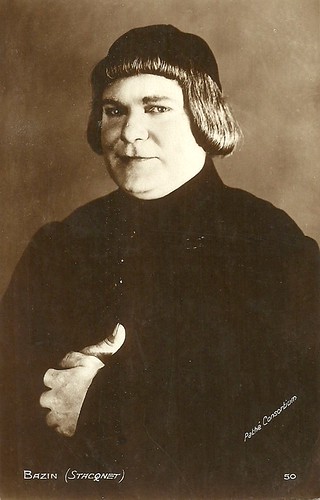
Antoine Stacquet as Bazin, one of the aids of the musketeers. French postcard by Cinémagazine Edition, no. 50. Photo: Pathé Consortium Cinéma. Publicity still for Vingt Ans Après (1922).
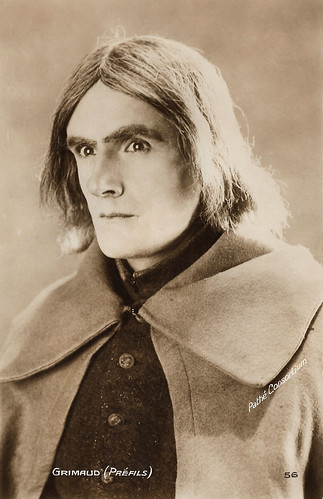
Louis Pré Fils as Grimaud. French postcard by Editions Cinémagazine no. 56. Photo: Pathé Consortium Cinéma. Publicity still for Vingt ans après (1922).
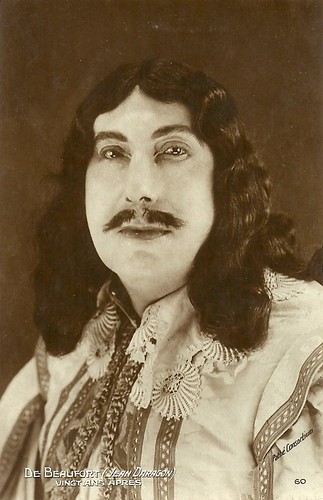
Jean Daragon as De Beaufort. French postcard by Cinémagazine Edition, no. 60. Photo: Pathé Consortium Cinéma. Publicity still for Vingt Ans Après (1922).
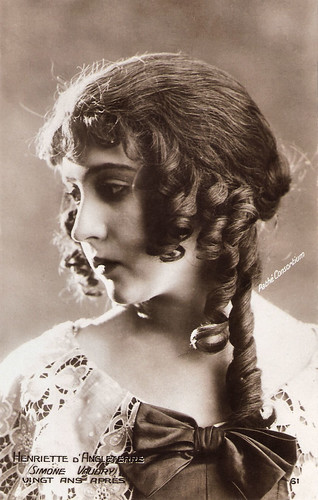
Simone Vaudry as Henriette d'Angleterre. French postcard by Cinémagazine Edition, no. 61. Photo: Pathé Consortium Cinéma. Publicity still for Vingt Ans Après (1922).
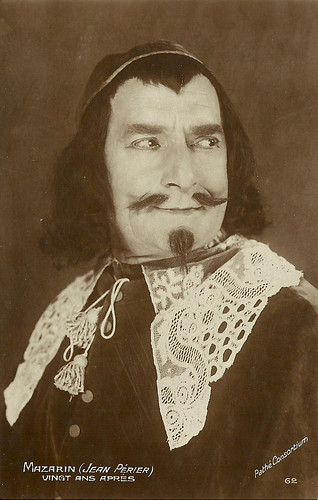
Jean Périer as Cardinal Mazarin. French postcard by Cinémagazine Edition, no. 62. Photo: Pathé Consortium Cinéma. Publicity still for Vingt Ans Après (1922). Collection: Didier Hanson.
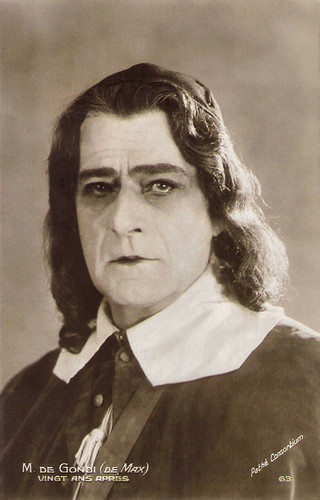
Édouard de Max as Monsieur de Gondi. French postcard by Cinémagazine Edition, no. 63. Photo: Pathé Consortium Cinéma. Publicity still for Vingt Ans Après (1922).
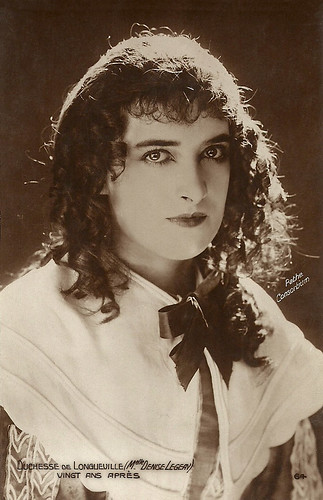
Denise Legeay as The Duchess of Longueville. French postcard by Cinémagazine Edition, no. 64. Photo: Pathé Consortium Cinéma. Publicity still for Vingt Ans Après (1922).
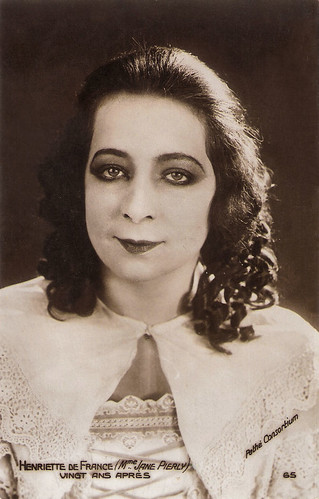
Jane Piérly as Henriette de France. French postcard by Editions Cinémagazine no. 65. Photo: Pathé Consortium Cinéma. Publicity still for Vingt ans après (1922).

Béatrice Bretty as La Belle Hôtelière. French postcard by Cinémagazine Edition, no. 67. Photo: Pathé Consortium. Publicity still for Vingt ans après/The Return of the Musketeers (Henri Diamant-Berger, 1922).
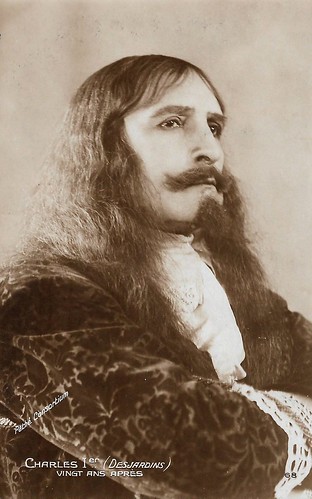
Maxime Desjardins as the English King Charles I. French postcard by Cinémagazine Edition, no. 68. Photo: Pathé Consortium. Publicity still for Vingt ans après/The Return of the Musketeers (Henri Diamant-Berger, 1922).
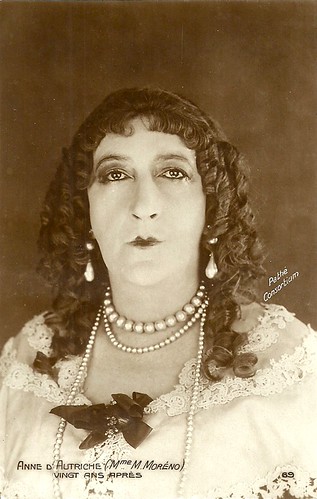
Marguerite Moreno as Queen Anne of Austria, widow of King Charles XIII. French postcard by Cinémagazine Edition, no. 69. Photo: Pathé Consortium. Publicity still for Vingt ans après/The Return of the Musketeers (Henri Diamant-Berger, 1922).
The film version of Vingt ans après/The Return of the Musketeers (1922) starts under Queen Anne of Austria regency and Cardinal Mazarin ruling. D'Artagnan, who seemed to have a promising career ahead of him at the end of The Three Musketeers, has for twenty years remained a lieutenant in the Musketeers. He seems unlikely to progress, despite his ambition and the debt the queen owes him.
By chance, however, he is summoned by Cardinal Mazarin (Jean Périer), who requires an escort, as the French people detest Mazarin, and are on the brink of rebellion (La Fronde).
D'Artagnan is sent to the Bastille to retrieve a prisoner, who turns out to be his former adversary, the Comte de Rochefort. But De Rochefort escapes. D'Artagnan goes searching for his old friends, and the four musketeers are reunited for one more time.
Pathé Frères again produced the film and Henri Diamant-Berger returned as director. D'Artagnan was not played by Aimé Simon-Girard this time. Jean Yonnel replaced him.
The other three musketeers of the original cast returned: Henri Rollan as Athos, Pierre de Guingand as Aramis, and Charles Martinelli as Porthos. Other actors who returned were Édouard de Max (Monsieur de Gondi) and Armand Bernard (D'Artagnan's servant Planchet).
They were joined in Vingt ans après by Marguerite Moreno as Anne of Austria, Jean Périer as Mazarin, Simone Vaudry as Henriette d'Angleterre, and Béatrice Bretty as a beautiful in-keeper.
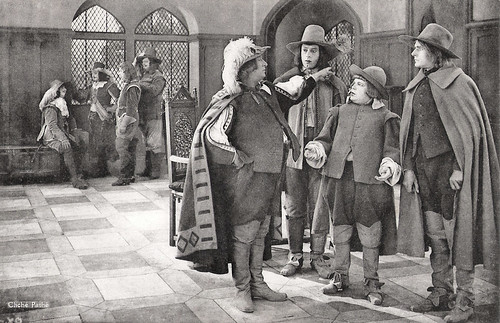
French postcard. Photo: Pathé. Publicity still for Vingt ans après/The Return of the Musketeers (Henri Diamant-Berger, 1922). Right front, small Antoine Stacquet as Bazin and tall Louis Pré Fils as Grimaud. Left in the back the three musketeers and D'Artagnan.
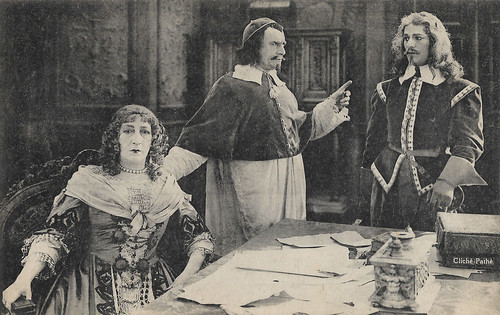
French postcard. Photo: Pathé. Publicity still for Vingt ans après/The Return of the Musketeers (Henri Diamant-Berger, 1922). Marguerite Moreno as Queen-Mother Anne of Austria, Jean Périer as Cardinal Mazarin, and Henri Rollan as Athos.
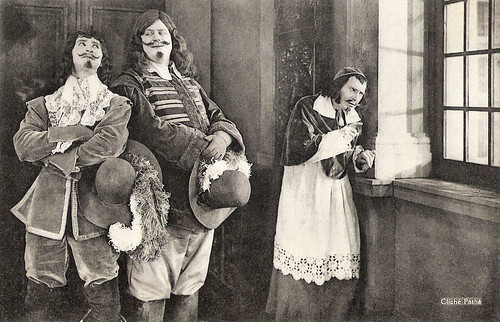
French postcard. Photo: Pathé. Publicity still for Vingt ans après/The Return of the Musketeers (Henri Diamant-Berger, 1922). Jean Yonnel as D'Artagnan, Charles Martinelli as Porthos, and Jean Périer as Cardinal Mazarin.
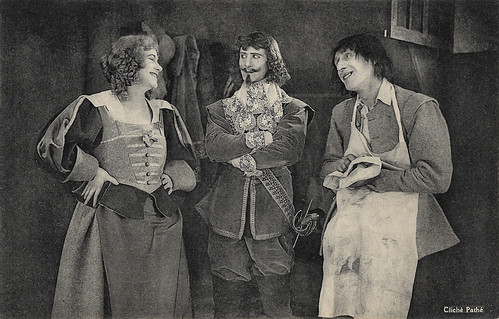
French postcard. Photo: Pathé. Publicity still for Vingt ans après/The Return of the Musketeers (Henri Diamant-Berger, 1922). Pictured are (possibly) Béatrice Bretty as La Belle Hôtelière, Jean Yonnel as D'Artagnan, and Armand Bernard as Planchet.
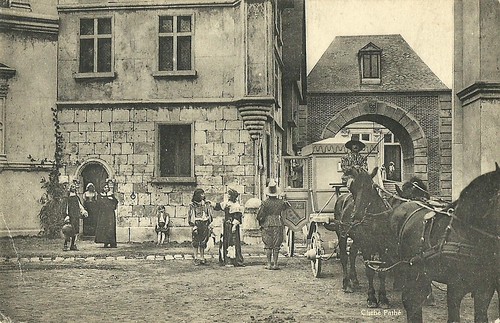
French postcard. Photo: Pathé. Publicity still for Vingt ans après/The Return of the Musketeers (Henri Diamant-Berger, 1922). The girl dressed up a boy is Pierrette Madd (Vicomte de Bragelonne).
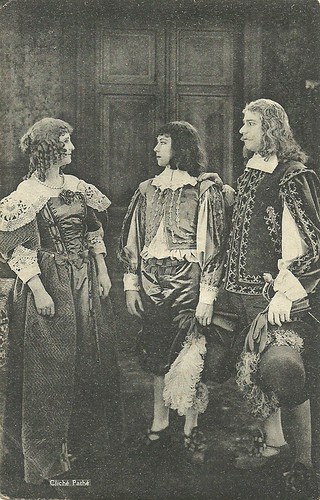
French postcard. French postcard. Photo: Pathé. Publicity still for Vingt ans après/The Return of the Musketeers (Henri Diamant-Berger, 1922). Athos presents his son, the Vicomte de Bragelonne, to the Queen.
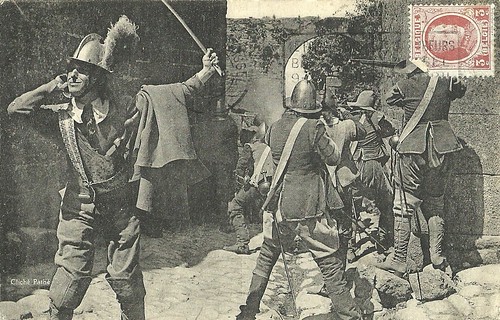
French postcard. Photo: Pathé. Publicity still for Vingt ans après/The Return of the Musketeers (Henri Diamant-Berger, 1922). Cromwellian soldiers in battle. This card made publicity on the retro for the screening of this film at the Pathé-Palace cinema in Brussels, Bd. Anspach, where it first ran 12-18 January 1923.
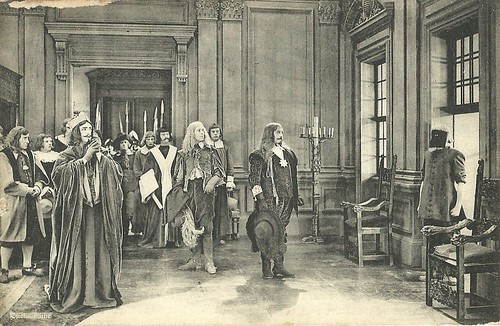
French postcard. French postcard. Photo: Pathé. Publicity still for Vingt ans après/The Return of the Musketeers (Henri Diamant-Berger, 1922). The henchman collecting Charles I.
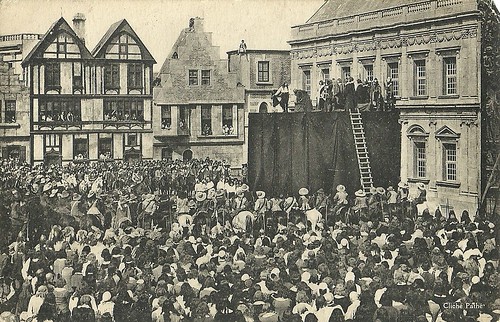
French postcard. French postcard. Photo: Pathé. Publicity still for Vingt ans après/The Return of the Musketeers (Henri Diamant-Berger, 1922). The execution of king Charles I on 30 January 1649 in London.
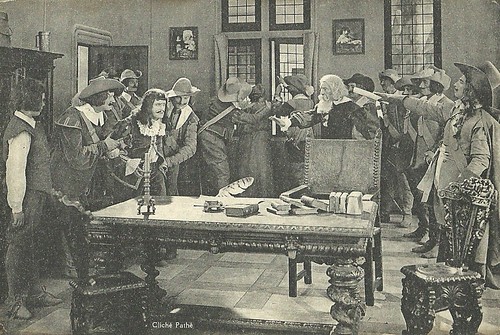
French postcard. French postcard. Photo: Pathé. Publicity still for Vingt ans après/The Return of the Musketeers (Henri Diamant-Berger, 1922).
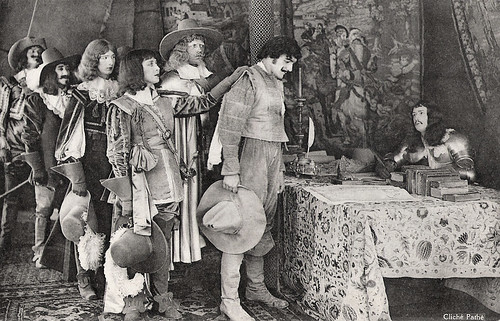
French postcard. Photo: Pathé. Publicity still for Vingt ans après/The Return of the Musketeers (Henri Diamant-Berger, 1922). The woman dressed up as a man in the middle is ;Pierrette Madd, who plays the Vicomte de Bragelonne, son of Athos.
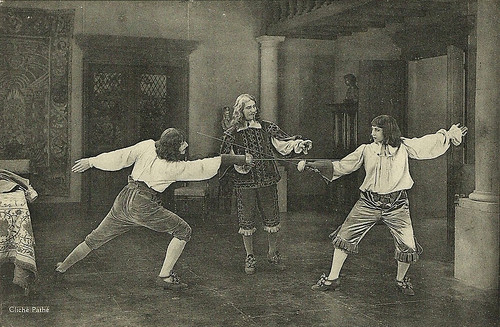
French postcard. Photo: Pathé. Publicity still for Vingt ans après/The Return of the Musketeers (Henri Diamant-Berger, 1922). Collection: Didier Hanson.
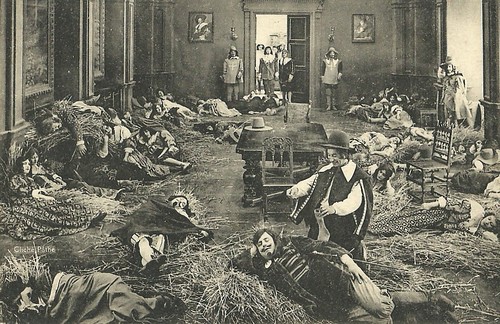
French postcard. French postcard. Photo: Pathé. Publicity still for Vingt ans après/The Return of the Musketeers (Henri Diamant-Berger, 1922). Porthos and Planchet [?].

French postcard. Photo: Pathé. Publicity still for Vingt ans après/The Return of the Musketeers (Henri Diamant-Berger, 1922). Collection: Didier Hanson.
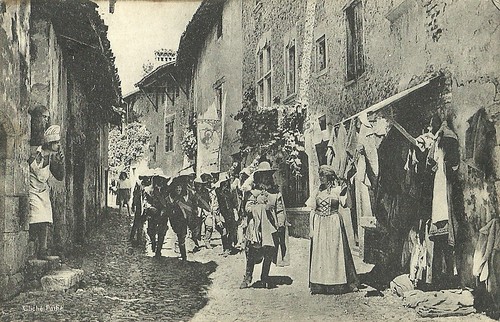
French postcard. French postcard. Photo: Pathé. Publicity still for Vingt ans après/The Return of the Musketeers (Henri Diamant-Berger, 1922).
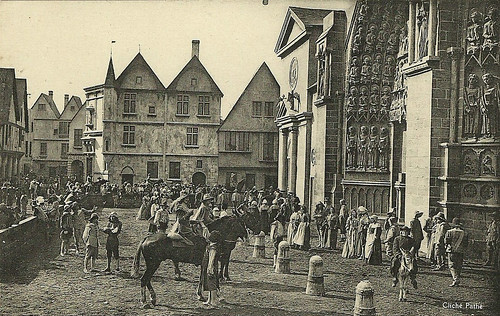
French postcard. Photo: Pathé. Publicity still for Vingt ans après/The Return of the Musketeers (Henri Diamant-Berger, 1922). Collection: Didier Hanson.

French postcard. Photo: Pathé. Publicity still for Vingt ans après/The Return of the Musketeers (Henri Diamant-Berger, 1922). Collection: Didier Hanson.
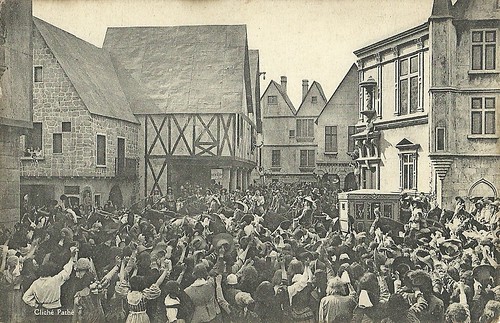
French postcard. Photo: Pathé. Publicity still for Vingt ans après/The Return of the Musketeers (Henri Diamant-Berger, 1922).
Sources: Wikipedia and IMDb.

French postcard. Photo: Pathé. Publicity still for Vingt ans après/The Return of the Musketeers (Henri Diamant-Berger, 1922). Athos (Henri Rollan) and his son Raoul, played by actress Pierrette Madd.

French postcard. Photo: Pathé. Publicity still for Vingt ans après/The Return of the Musketeers (Henri Diamant-Berger, 1922). Collection: Didier Hanson.

French postcard. Photo: Pathé. Publicity still for Vingt ans après/The Return of the Musketeers (Henri Diamant-Berger, 1922). Collection: Didier Hanson.

French postcard. Photo: Pathé. Publicity still for Vingt ans après/The Return of the Musketeers (Henri Diamant-Berger, 1922). Collection: Didier Hanson.

French postcard. Photo: Pathé. Publicity still for Vingt ans après/The Return of the Musketeers (Henri Diamant-Berger, 1922). The four musketeers Porthos (Charles Martinelli), Aramis (Pierre de Guingand), Athos (Henri Rollan), and D'Artagnan (Jean Yonnel).
Alexandre Dumas
Vingt ans après literally translates as Twenty Years After, but abroad the film was also known as The Return of the Three Musketeers. It was a sequel to the successful Pathé serial Les Trois Mousquetaires/The Three Musketeers (Henri Diamant-Berger, 1921), which had been only the second adaptation of the famous adventure novel by Alexandre Dumas père, published in 1844.
Vingt ans après/The Return of the Musketeers (Henri Diamant-Berger, 1922) was also based on a novel by Alexandre Dumas père. Dumas first serialised Vingt ans après from January to August 1845. His novel follows events in France during the Fronde, during the childhood reign of Louis XIV, and in England near the end of the English Civil War, leading up to the victory of Oliver Cromwell and the execution of King Charles I.
Through the words of the main characters, particularly Athos, Dumas comes out on the side of the monarchy in general, or at least the text often praises the idea of benevolent royalty. His musketeers are valiant and just in their efforts to protect young Louis XIV and the doomed Charles I from their attackers.
Vingt ans après precedes another novel, The Vicomte of Bragelonne: Ten Years Later (Le Vicomte de Bragelonne ou Dix ans plus tard), which appeared first in serial form between 1847 and 1850.
It includes the subplot The Man in the Iron Mask about the fictive twin brother of Louis XIV, Philippe, who had been concealed and imprisoned from birth by his father, Louis XIII, and his mother, Anne of Austria, 'for the good of France'.

Pierre de Guingand as Aramis. French postcard by Cinémagazine Edition no. 43. Photo: Pathé Consortium Cinéma. Publicity still for Vingt Ans Après (1922).

Jean Yonnel as D'Artagnan. French postcard by Editions Cinémagazine Edition, no. 45. Photo: Pathé Consortium Cinéma. Publicity still for Vingt Ans Après (1922).

Pierrette Madd as Raoul, the Vicomte de Bragelonne. French postcard by Cinémagazine Edition no. 47. Photo: Pathé Consortium Cinéma. Publicity still for Vingt Ans Après (1922).

Antoine Stacquet as Bazin, one of the aids of the musketeers. French postcard by Cinémagazine Edition, no. 50. Photo: Pathé Consortium Cinéma. Publicity still for Vingt Ans Après (1922).

Louis Pré Fils as Grimaud. French postcard by Editions Cinémagazine no. 56. Photo: Pathé Consortium Cinéma. Publicity still for Vingt ans après (1922).

Jean Daragon as De Beaufort. French postcard by Cinémagazine Edition, no. 60. Photo: Pathé Consortium Cinéma. Publicity still for Vingt Ans Après (1922).

Simone Vaudry as Henriette d'Angleterre. French postcard by Cinémagazine Edition, no. 61. Photo: Pathé Consortium Cinéma. Publicity still for Vingt Ans Après (1922).

Jean Périer as Cardinal Mazarin. French postcard by Cinémagazine Edition, no. 62. Photo: Pathé Consortium Cinéma. Publicity still for Vingt Ans Après (1922). Collection: Didier Hanson.

Édouard de Max as Monsieur de Gondi. French postcard by Cinémagazine Edition, no. 63. Photo: Pathé Consortium Cinéma. Publicity still for Vingt Ans Après (1922).

Denise Legeay as The Duchess of Longueville. French postcard by Cinémagazine Edition, no. 64. Photo: Pathé Consortium Cinéma. Publicity still for Vingt Ans Après (1922).

Jane Piérly as Henriette de France. French postcard by Editions Cinémagazine no. 65. Photo: Pathé Consortium Cinéma. Publicity still for Vingt ans après (1922).

Béatrice Bretty as La Belle Hôtelière. French postcard by Cinémagazine Edition, no. 67. Photo: Pathé Consortium. Publicity still for Vingt ans après/The Return of the Musketeers (Henri Diamant-Berger, 1922).

Maxime Desjardins as the English King Charles I. French postcard by Cinémagazine Edition, no. 68. Photo: Pathé Consortium. Publicity still for Vingt ans après/The Return of the Musketeers (Henri Diamant-Berger, 1922).

Marguerite Moreno as Queen Anne of Austria, widow of King Charles XIII. French postcard by Cinémagazine Edition, no. 69. Photo: Pathé Consortium. Publicity still for Vingt ans après/The Return of the Musketeers (Henri Diamant-Berger, 1922).
The last reunion of the Four Musketeers
The film version of Vingt ans après/The Return of the Musketeers (1922) starts under Queen Anne of Austria regency and Cardinal Mazarin ruling. D'Artagnan, who seemed to have a promising career ahead of him at the end of The Three Musketeers, has for twenty years remained a lieutenant in the Musketeers. He seems unlikely to progress, despite his ambition and the debt the queen owes him.
By chance, however, he is summoned by Cardinal Mazarin (Jean Périer), who requires an escort, as the French people detest Mazarin, and are on the brink of rebellion (La Fronde).
D'Artagnan is sent to the Bastille to retrieve a prisoner, who turns out to be his former adversary, the Comte de Rochefort. But De Rochefort escapes. D'Artagnan goes searching for his old friends, and the four musketeers are reunited for one more time.
Pathé Frères again produced the film and Henri Diamant-Berger returned as director. D'Artagnan was not played by Aimé Simon-Girard this time. Jean Yonnel replaced him.
The other three musketeers of the original cast returned: Henri Rollan as Athos, Pierre de Guingand as Aramis, and Charles Martinelli as Porthos. Other actors who returned were Édouard de Max (Monsieur de Gondi) and Armand Bernard (D'Artagnan's servant Planchet).
They were joined in Vingt ans après by Marguerite Moreno as Anne of Austria, Jean Périer as Mazarin, Simone Vaudry as Henriette d'Angleterre, and Béatrice Bretty as a beautiful in-keeper.

French postcard. Photo: Pathé. Publicity still for Vingt ans après/The Return of the Musketeers (Henri Diamant-Berger, 1922). Right front, small Antoine Stacquet as Bazin and tall Louis Pré Fils as Grimaud. Left in the back the three musketeers and D'Artagnan.

French postcard. Photo: Pathé. Publicity still for Vingt ans après/The Return of the Musketeers (Henri Diamant-Berger, 1922). Marguerite Moreno as Queen-Mother Anne of Austria, Jean Périer as Cardinal Mazarin, and Henri Rollan as Athos.

French postcard. Photo: Pathé. Publicity still for Vingt ans après/The Return of the Musketeers (Henri Diamant-Berger, 1922). Jean Yonnel as D'Artagnan, Charles Martinelli as Porthos, and Jean Périer as Cardinal Mazarin.

French postcard. Photo: Pathé. Publicity still for Vingt ans après/The Return of the Musketeers (Henri Diamant-Berger, 1922). Pictured are (possibly) Béatrice Bretty as La Belle Hôtelière, Jean Yonnel as D'Artagnan, and Armand Bernard as Planchet.

French postcard. Photo: Pathé. Publicity still for Vingt ans après/The Return of the Musketeers (Henri Diamant-Berger, 1922). The girl dressed up a boy is Pierrette Madd (Vicomte de Bragelonne).

French postcard. French postcard. Photo: Pathé. Publicity still for Vingt ans après/The Return of the Musketeers (Henri Diamant-Berger, 1922). Athos presents his son, the Vicomte de Bragelonne, to the Queen.

French postcard. Photo: Pathé. Publicity still for Vingt ans après/The Return of the Musketeers (Henri Diamant-Berger, 1922). Cromwellian soldiers in battle. This card made publicity on the retro for the screening of this film at the Pathé-Palace cinema in Brussels, Bd. Anspach, where it first ran 12-18 January 1923.

French postcard. French postcard. Photo: Pathé. Publicity still for Vingt ans après/The Return of the Musketeers (Henri Diamant-Berger, 1922). The henchman collecting Charles I.

French postcard. French postcard. Photo: Pathé. Publicity still for Vingt ans après/The Return of the Musketeers (Henri Diamant-Berger, 1922). The execution of king Charles I on 30 January 1649 in London.

French postcard. French postcard. Photo: Pathé. Publicity still for Vingt ans après/The Return of the Musketeers (Henri Diamant-Berger, 1922).

French postcard. Photo: Pathé. Publicity still for Vingt ans après/The Return of the Musketeers (Henri Diamant-Berger, 1922). The woman dressed up as a man in the middle is ;Pierrette Madd, who plays the Vicomte de Bragelonne, son of Athos.

French postcard. Photo: Pathé. Publicity still for Vingt ans après/The Return of the Musketeers (Henri Diamant-Berger, 1922). Collection: Didier Hanson.

French postcard. French postcard. Photo: Pathé. Publicity still for Vingt ans après/The Return of the Musketeers (Henri Diamant-Berger, 1922). Porthos and Planchet [?].

French postcard. Photo: Pathé. Publicity still for Vingt ans après/The Return of the Musketeers (Henri Diamant-Berger, 1922). Collection: Didier Hanson.

French postcard. French postcard. Photo: Pathé. Publicity still for Vingt ans après/The Return of the Musketeers (Henri Diamant-Berger, 1922).

French postcard. Photo: Pathé. Publicity still for Vingt ans après/The Return of the Musketeers (Henri Diamant-Berger, 1922). Collection: Didier Hanson.

French postcard. Photo: Pathé. Publicity still for Vingt ans après/The Return of the Musketeers (Henri Diamant-Berger, 1922). Collection: Didier Hanson.

French postcard. Photo: Pathé. Publicity still for Vingt ans après/The Return of the Musketeers (Henri Diamant-Berger, 1922).
Sources: Wikipedia and IMDb.
1 comment:
Wonderful compositions and costumes
Post a Comment